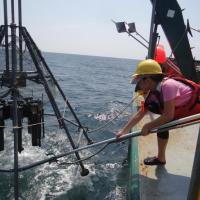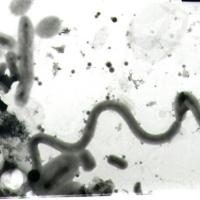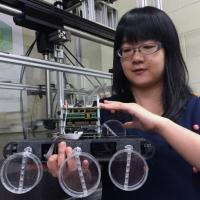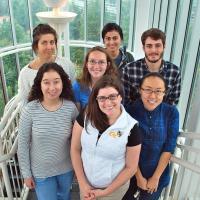News

Suddenly, a roundworm overhauls an array of survival strategies, and researchers suspect multiple mutations caused them. But they're surprised when they trace the sweeping changes back to one tiny mutation on a single gene. It's a great hint at a…

When early terrestrial animals began moving about on mud and sand 360 million years ago, the powerful tails they used as fish may have been more important than scientists previously realized. That’s one conclusion from a new study of African…

A new study from the Georgia Institute of Technology finds that older people struggle to remember important details because their brains can’t resist the irrelevant “stuff” they soak up subconsciously.

A new modeling study conducted by researchers in Georgia Tech’s School of Earth and Atmospheric Sciences shows that for decades, air pollution drifting from East Asia out over the world’s largest ocean has kicked off a chain reaction that…

A nanoparticle commonly used in food, cosmetics, sunscreen and other products can have subtle effects on the activity of genes expressing enzymes that address oxidative stress inside two types of cells. While the titanium dioxide (TiO2)…

Over the past several decades, scientists have observed a significant increase in the melting of glacial land ice on the island of Greenland, spurring concerns about global sea level rise and the long-term effects of atmospheric warming. What has…

On April 20, 2010, an explosion on the Deepwater Horizon (DWH) oil rig released a torrent of oil in the seafloor of the Gulf of Mexico, discharging close to 5 million barrels of oil in 87 days. It was the largest accidental oil spill in U.S.…

In humans, cholera is among the world’s most deadly diseases, killing as many as 140,000 persons a year, according to World Health Organization statistics. But in aquatic environments far away from humans, the same bacterium attacks neighboring…

Georgia Techresearchers are participating in a multicenter genetic study of prostate cancer in Sub-Saharan Africa to try to find new information about the genetic causes of prostate cancer. Men of African descent suffer disproportionately from…

The Torres lab has been awarded a four year, $1.2 million grant by the National Institutes of General Medical Sciences to investigate a newly discovered regulatory mechanism that controls G protein signaling, a process essential for the…

Marine microorganisms play a critical role in capturing atmospheric carbon, but a new study finds much less certainty than previously believed about the populations of the viruses that infect these important organisms.

NASA-funded researchers at the Georgia Institute of Technology are tapping information found in the cells of all life on Earth, and using it to trace life’s evolution. They have learned that life is a master stenographer – writing, rewriting and…

Two researchers from the Georgia Institute of Technology are riding a second wave of grants from the National Institutes of Health (NIH) to support the Brain Research through Advancing Innovative Neurotechnologies (BRAIN) Initiative.

When a Lake Malawi cichlid loses a tooth, a new one drops neatly into place as a replacement. Why can't humans similarly regrow teeth lost to injury or disease?

Petit Institute researchers Christine Payne and Garrett Stanley contributing to global effort

Having a light touch can make a hefty difference in how well animals and robots move across challenging granular surfaces such as snow, sand and leaf litter. Research shows how the design of appendages – whether legs or wheels – affects the…




